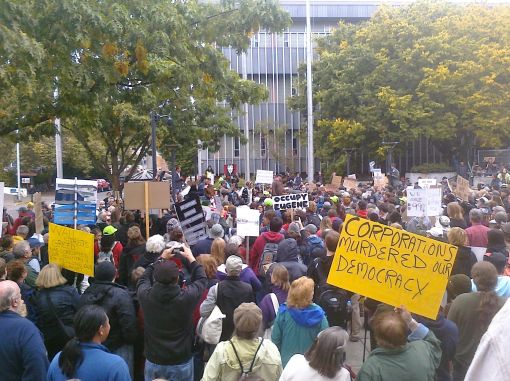Yesterday afternoon Yair and I walked over to the farmer’s market, picked up delicious fruit and checked out the locally-organized Occupy Eugene rally. About 500 people gathered for singing, speeches, marching and the waving of homemade cardboard signs that bore a variety of slogans.
Not all of the slogans resonated with me, but the rally did get me thinking and wondering:
1. When the Federal government bailed out certain corporations, were there any behavior-related strings attached? Could the government have dictated that – until the money was repaid – there would be a freeze on salary and bonus increases?
2. Has / will the money be fully repaid (loan vs. grant) and within what period of time?
3. If salaries and bonuses were frozen, how much job flight would there have actually been? In this economy with many talented citizens unemployed, wouldn’t retention have been a less pressing issue?
4. Is the “too big to fail” argument sound? To take one example, what would have been the ramifications of letting Lehman Brothers fail?
5. There are economists who believe that the U.S. government and president are incapable of exerting a real influence on the health of the economy. Is this so?
6. There was much talk about campaign finance reform. Should corporations be able to fund political candidates?
I’m only at the start of a thoughtful and deliberate conversation, but I’m all ears to your comments!
posted by ayo



I would add to #6 by addressing a # of issues
Previous attempts at campaign finance have failed because they violate free speech rights under the 5th amendment, so the question becomes how to have meaningful reforms without violating free speech protections. John McCain and Russ Feingold spent years trying to do, this only to see it overturned on constitutional grounds.
Also I’m wondering why in #6 you are asking only about barring corporations. Should unions also be barred? How about other special interest groups?
I’m also all for holding unjust corporate practices up to public scrutiny, just wondering if Congress and the President are getting some sort of free pass on these issues. Previously in our history such protests were generally targeted towards our elected officials who have a duty to look out for us, what makes this time so different?
Hey Weston,
Interesting points about free speech rights, and I suppose that question six would extend to unions and organized groups. I might view unions differently because they (seemingly) protect certain groups and therefore of course have special interests and might want to endorse a political candidate. But it’s definitely something to think about.
“I might view unions differently because they (seemingly) protect certain groups and therefore of course have special interests ”
Ayo
Got to disagree with you on both a philosophical and practical level.
First, I am a strong believer that in order for our constitutional rights to be meaningful they have to be available to everyone. I shouldn’t be able to decide who has freedom of speech, religion, assembly etc based entirely upon my subjective opinion as to whether they are protecting certain groups or my subjective opinion as to whether other people’s opinions are right or wrong.
Second. Can’t your standard of being treated differently ‘because they (seemingly) protect certain groups and therefore have special interests” also be true of corporations? They protect certain groups and have a special interest. Should General Electric have greater speech rights in order to protect it’s 583,000 shareholders and 300,000 employees than the UAW has in protecting it’s 350,000 members?
My wife’s union pension (like most union pensions) is primarily invested in corporate stocks and bonds. Who should have greater free speech rights to protect her?
Wonderful and challenging discussion. Thanks for posting on it.
If you can, watch the documentary “Inside Job”. It’s fabulous and covers most of what went down.
Hey Brenda!
Yair and I actually watched “Inside Job” a month or two ago. It was very well done and I feel like I have a basic understanding of the issues, but I would still love to apply that understanding toward conversations exploring the questions above with different people.
Just added Inside Job to my Netflix queue – thanks for the recommendation – these topics are all really interesting to me but I have only the most basic grasp of what’s going on. How corporations/government/Wall Street works is so confusing to me…
Let me know what you think of the film when you get around to watching it!
Not sure where to start, as summarizing a multi-year financial crisis into a blog response is a tall order. Maybe it’s better left for a Skype convo with you sometime.
One thing I did want to note: You wrote “To take one example, what would have been the ramifications of letting Lehman Brothers fail?” Lehman Brothers DID fail, so the ramifications are on the table for us to examine.
Hi Rach,
Yeah, let’s definitely chat politics and economics when we next connect. I do have a fair understanding of the crisis, subprime mortgages, etc. but am trying to reconcile that understanding with questions being asked by the Occupy Wall Street movement.
As for Lehman Brothers, you’re of course right. I had meant to write “AIG” and LB was a typo. Looking forward to chatting!
here’s a history lesson:
1. there were strings and they were followed. feinberg was appointed pay czar.
2. all the money center banks paid back the tarp funds (the auto companies didn’t) with interest. the government also had warrants which they sold. net net: the government made billions of profits on the bank bailout per the omb and treasury secretary geithner
3. there was significant job flight and it created a major exodus of underwriting to london from the us. sarbanes oxley meant well but created an un-level playing field because there were tight regulations placed here but not overseas. they also created a shadown banking system and never to this day have they dealt with cds spreads and derivatives.
4. lehman was actually the one institution they let fail and many people believe that they did that deliberately as payback for dick fuld not participating in the 1999 bailout of long term capital management (john meriwether’s firm who worked with me at phibro salomon) when all the other money center banks were “arm twisted” into participating.
5. the president and congress can have negative effects by broadcasting hearings and jawboning which adversely impacts investment and spending. the best they can do for positive impact is to coordinate fiscal and monetary policy, but populist speeches, though good for elections, will always hurt the economy due to the impact of reducing consumer spending, accelerating de-leveraging and postponing investment and job hiring. also targeting banks and then wondering why they are not making loans, mortgages, etc is childish; instant gratification and populist, but not smart economically.
6. unfortunately, campaigning for office has become a big budget issue. it doesn’t matter whether the funding comes from corporations, unions, foreign governments, etc; this part of the system is broken. why have political action committees that can raise $30-$50 million (whether at the rate of $100 per person or $1000 per head dinners). limit an election budget to $5mm and there would be more focus on issues and less on the consultants, media panels, etc. let’s go back to oaktag and stump speeches 🙂
hope that was helpful!
well put.
Wow, Anon Financial Dude. You definitely know your stuff. (I just read your comment THREE times to let all of the information fully sink in.)
Thank you for taking the time to answer the questions, and explain this both to me and the other readers! 🙂
Anon misses on a lot of the questions:
1) yes, but it was very very very weak. They found ways around it.
2) The government did not make money off of the bank bailouts and is still owed a lot. This is a link to an actual Wall Streeter who tracks stuff like this: http://www.ritholtz.com/blog/2011/03/tarp-gse-256-billion-in-the-red/
And, another with explanations on things most people don’t include as subsidies, but are and aren’t paid back:
http://www.zerohedge.com/article/no-big-banks-have-not-paid-back-government-bailouts-and-subsidies
3) There was some job flight, but by no means was London going to take a huge chunk of this business. Plus, do we really want to keep these “geniuses?” Not really, as they are the main culprits in this mess and there are plenty left to replace them with.
4) No, the “to big to fail” argument is not sound. Yes, just letting the dominoes fall would have hurt us very badly very quickly, but we would also be past it much sooner. It should be noted that the ideal response would have been the Swedish response, which basically would have allowed the banks to fail (investors/bond holders take the loss, as it should be) but the government guarantees certain assets so there isn’t a run on the banks. Obviously, this is way way way over simplified. Here is a link: http://www.nytimes.com/2008/09/23/business/worldbusiness/23krona.html
5) Yes, but it’s never the entire reason and usually not the main reason. @Anon – Targeting banks is not why they aren’t lending. They aren’t lending because they can borrow money from the Fed at 0% and buy U.S. Treasuries for a risk free 1-3% return. Why would they lend?
6) Definitely broken and broken very badly.
I would also suggest “Bailout Nation” by Barry Ritholtz, as the definitive book on the whole mess.
An example of how this hasn’t ended, so it’s impossible to say everything was paid back.
http://www.ritholtz.com/blog/2011/10/fed-bofa-dump-billions-in-losses-onto-taxpayers/
Sorry, this topic is a pet interest and a pet peave, as there is so much misinformation out there because of how complicated it is.
I’m not just some layman either. I actually have financial/accounting training, and I audited banks at one point in my life.